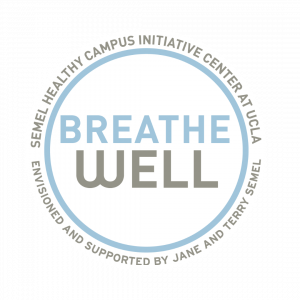Frequently Asked Questions
What does it mean to be tobacco-free?
Use of all tobacco products, including but not limited to cigarettes, cigars, pipes, smokeless tobacco and electronic cigarettes, is prohibited on all UCLA owned or leased property as of April 22, 2013. This refers to all parts of the UCLA Campus, including campus buildings, private residential facilities, parking areas, and grounds areas. This also includes all other University owned or leased property or facilities operated by UCLA staff or faculty in support of UCLA administrative, teaching, research, medical care or other public service functions or to provide private residential facilities for UCLA students, faculty and staff.
Anyone on UCLA property is subject to the policy, including students, employees and visitors. The policy will be initially educational rather than punitive and successful implementation of the policy depends on the cooperation and engagement of all community members in spreading awareness that UCLA is now a tobacco-free zone.
Are there designated smoking areas on campus?
No. The use of tobacco is prohibited on all property owned or leased by the university.
Does this policy apply to city owned streets and sidewalks?
No. The university has no jurisdiction over the use of city owned streets and sidewalks. However we do ask that smokers be considerate of our neighbors in the Westwood community if they go off campus to smoke.
What cessation support is provided for students?
UCLA is committed to providing cessation support for all interested students. Please visit the Ashe Center Student Health Website for more information. All tobacco users who want to quit are encouraged to call the free California Smokers Helpline, 1-800-NO-BUTTS, available in multiple languages.
What cessation support is provided for employees?
UCLA is committed to providing our faculty and staff with a tobacco-free environment.
All UCLA-provided health plans offer quit support. Please visit www.uclahealth.org/smokefree/ for more information. UCLA also encourages use of California’s free Smoker’s Helpline at 1-800-NO-BUTTS, available in multiple languages.
What about tobacco users who don’t want to quit?
This policy doesn’t demand that tobacco users quit, they just can no longer use tobacco on the UCLA campus. Just as tobacco users need to prepare to address nicotine withdrawal symptoms when they fly across country or are in other smoke-free zones, tobacco users will need to prepare to be tobacco-free on campus.
Does the evidence support risk of exposure of secondhand smoke?
According to the Surgeon General and other reports, there is no safe level of exposure to environmental tobacco smoke, and environmental tobacco smoke is capable of causing cancer. The American College Health Association recommended that all colleges and universities attempt to achieve a 100% tobacco-free environment, indoors and outdoors. Information about the health risks of secondhand smoke, including reports from the Surgeon General, and other research studies can be found at www.tobaccofree.ucla.edu. .
Why are electronic cigarettes and smoke-less tobacco products included in the policy?
These products were specifically included in President Yudof’s charge to create tobacco-free policies for all of the campuses. Electronic cigarettes contain nicotine, are not approved by the FDA and have not been recommended to support quit efforts. We want to steer tobacco-users toward proven methods of quitting.
Isn’t tobacco use a legal right?
Tobacco is a legal product for adult use, however the university can legally establish policies regarding tobacco use on its property for the help of the campus community, much like it can regulate alcohol.
How should I approach someone who is smoking or using tobacco products on campus?
We ask that our entire community aid in informing others on campus about our tobacco-free policy. If you see someone using tobacco at UCLA, you can politely let them know that UCLA is a tobacco-free campus and ask them to please refrain. Possible approaches include: “Did you know that UCLA is now tobacco-free? Could you please dispose of that cigarette/tobacco product?” or “UCLA is now a 100% tobacco-free campus. Please don’t smoke/use tobacco here.” Informational cards will be available to hand out. While not everyone will feel comfortable approaching tobacco users, all students, faculty and staff are expected to comply with the policy and refrain from using tobacco.
What about our neighbors?
UCLA asks that our students, faculty, staff and visitors respect our Westwood neighbors and help maintain a positive relationship with them. We ask that members of our community not litter or congregate on others’ properties. The university additionally asks that smokers and other tobacco users be careful to dispose of cigarettes or other trash properly. We have reached out to our neighbors to inform them of our upcoming policy and encourage open communication of any problems.
If an employee chooses to continue to use tobacco and does not have enough time during breaks to step off campus, how does the supervisor respond?
The University is aware that nicotine is a highly addictive drug and waiting until lunch or after work will be extremely difficult for some. Supervisors should encourage employees to prepare to handle cravings during the workday. Nicotine replacement measures like Nicorette gum or lozenges are encouraged for times when it is inconvenient to smoke.
The policy requires that students, faculty and staff step off campus to smoke. What about the personal safety of these individuals?
As in any large city, it is vitally important that all individuals consider their safety and well-being both on and off campus. During the workday, nicotine replacement lozenges, gums, patches, inhalers and others are alternate options to leaving campus.
For those who choose to leave campus at night to smoke, please review information regarding evening van service, along with the locations of all emergency reporting system telephones.
If you have further inquiries please email us at tobaccofree@ucla.edu. https://police.ucla.edu/emergency-information/emergency-calling-9-1-1
